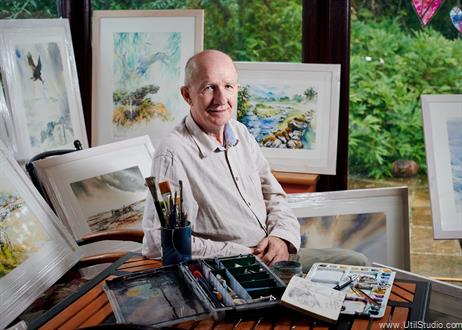CLARE’S vibrant arts sector is the envy of many counties. Renowned globally for its traditional music, the Banner county not only produces some of the finest creative talents, it also attracts musicians, dancers and artists who come here for inspiration and in the hope that a thriving artistic scene will support them in making a living on the path less travelled. Now, in the context of ongoing pandemic restrictions, access to audiences at venues like galleries, concert venues and pubs, and to collaborators, is shut down, for now. So too are vital income streams. While some government support is available in the form of the Pandemic Unemployment Payment, as well as a COVID-19 Crisis Response Award from the Arts Council, many are facing serious set-backs financially and creatively.
Renowned Newmarket-based visual artist Philip Brennan faced the extraordinary experience recently of having a freshly-installed exhibition hanging in empty halls behind the doors of a locked building. After more than two decades of creating and showing art in Ireland and internationally, the situation was unprecedented. ‘Clare Moments,’ a water colours exhibition, which had showed in Ennis, Kilkee and Shannon to great success, had just been installed at Scariff Library and Philip was preparing to gauge the reaction of East Clare audiences. “As it turned out, the lock-down came into force just as the show was to launch,” Philip explained. “So the paintings sat, unseen, on the walls for five weeks… definitely a first for me.”
Seeing months of painstakingly plans vanish into thin air has also been the experience of Miltown Malbay-based Claire Watts, who like thousands around the country is reeling from the cancellation of this year’s Willie Clancy Summer School. “The impact of the Covid-19 restrictions has manifested in a variety of different ways,” she told The Champion. “As a singer-songwriter and musician used to earning money from gigs, having launched a nationwide house concert tour this year, playing sessions locally and, more recently, busking at the Cliffs of Moher… the restrictions have been hugely limiting in terms of both my income and my audience.”
Claire’s novel and well-received plans to perform intimate gigs in people’s homes has been thrown into doubt and is affecting her ability to tour sustainably, maintain her profile and keep up with her PhD studies at the University of Limerick (UL).
“The cost of being a student, especially living remotely are huge, from the point of view of travelling expenses and living expenses. The cost of being a mature student, living remotely, is also high, with extra expense cropping up with childcare, especially considering my husband retired early through ill health.”
To combat the loss of income and to anchor herself during a time of worry and of bereavement, Claire threw herself into a ‘Busking from the Bungalow’ project. “Each day at 10am for ten minutes, I perform a short live concert from my home,” she explained, “also giving a special children’s episode on Mondays and performing a short 30-minute set on Monday evenings.”
Of the government’s reaction to the Coronavirus crisis, Claire described herself as”impressed and humbled”. “As artists, we are very familiar with trying to navigate our way through the minefield of funding, arts council applications, fund-it campaigns, etc. I, for one, was very lucky to avail of the crisis payment which has kept my family and business afloat at a time when anxiety and worry threatened to engulf me.”
The government’s recently announced road map is also a source of hope for the arts community. “Restrictions appear to be slowly easing,” Claire noted. “I look forward to getting back out playing, particularly at the Cliffs [of Moher], which will provide my main revenue for the summer months, as I attempt to finish my first chapter of my PhD in Arts Practice.”
In Scariff, visual artist and arts facilitator, Nathalie El Baba is also looking at creative responses to the pandemic and ways of working with the young people and groups she would normally interact with.
“All of my community-based practice is gone for now in its regular format,” she said. “Clare Arts Office has been supporting those of us working in schools and other settings by providing training in working remotely and digitally. For the first month of restrictions, there was panic for many in the arts, now we’re moving more towards practical solutions.”
Questions about long-term funding are among Nathalie’s concerns and like many she is wondering what the future will hold for the arts sector: “The point is being made by some that the move to online art, while very welcome in lots of ways, has cut the need for funding, meaning that financial support may be less likely to be provided in the future.”
As to the role of artists in helping people to make sense of their feelings at a time of unprecedented challenge, Nathalie is very positive: “People are communicating now more than ever, through cards, calls and letters, as well as social media. I think there’s a new level of authenticity in our interactions with each other. We have time to slow down now and explore what we are feeling. Profound things are taking place and I think it is the role of the artist to reflect that and to help people to express it.”


